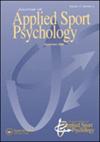Support for athletes with eating psychopathology symptoms: Exploring the views of athletes, coaches and sport practitioners
IF 3.2
2区 心理学
Q2 HOSPITALITY, LEISURE, SPORT & TOURISM
引用次数: 5
Abstract
Abstract Eating psychopathology is prevalent among athletes yet little is known about how to effectively support athletes with eating difficulties. This study aimed to understand athletes’ and sport professionals’ experiences of, and perspectives toward, supporting athletes with eating psychopathology. Forty-five participants took part in the study and data were collected using two methods: (a) individual interviews were held with athletes with current or previous eating psychopathology symptoms (n = 13); and (b) six focus groups were conducted: two with athletes with no history of eating psychopathology (n = 13), two with coaches (n = 7), and two with sport practitioners (n = 12). The data were analyzed using thematic analysis and two overarching themes were identified. Theme 1 (Tensions around addressing eating psychopathology in athletes) highlighted challenges with communication, conflicting perceptions around the responsibility of addressing and intervening with athlete eating concerns, and difficulties with obtaining relevant and timely support for athletes. Theme 2 (Considerations for developing practical tools to support athletes with eating psychopathology) highlighted a desire for future resources to consider confidentiality, to preserve athletes’ identities and facilitate independence where the athlete is in control of the degree and pace of engagement. In conclusion, tensions exist between athletes and sport professionals which make addressing eating psychopathology in athletes difficult. There is a need to develop accessible, confidential and tailored practical support resources which athletes can engage with independently to support them in the early stages of an eating problem. Lay summary: There is a need to understand how athletes with eating problems can be more effectively supported. Athletes, coaches and sport practitioners shared their thoughts around supporting athletes with an eating problem. Findings highlight the need to develop accessible, confidential and tailored athlete support resources. IMPLICATIONS FOR PRACTICE Tensions exist among athletes and sport professionals in relation to communication around eating attitudes and behaviors, responsibility for addressing eating concerns, and obtaining relevant and timely support for eating problems which make addressing eating psychopathology in athletes difficult. Both sport professionals and athletes would benefit from education and training around the connotation and consequences of eating psychopathology which could be delivered by individuals with valuable knowledge of both eating psychopathology and the sport context. There is a need to develop accessible, confidential and tailored early intervention resources which athletes can access with ease and engage with independently in the early stages of an eating problem (e.g., self-led interventions).支持有饮食精神病理学症状的运动员:探索运动员、教练和体育从业者的观点
摘要饮食精神病理学在运动员中很普遍,但人们对如何有效支持有饮食困难的运动员知之甚少。本研究旨在了解运动员和体育专业人士对支持患有饮食精神病理学的运动员的经历和观点。45名参与者参与了这项研究,并使用两种方法收集数据:(a)对目前或以前有饮食精神病理学症状的运动员进行个体访谈(n = 13) ;(b)进行了六个焦点小组:两个是没有饮食精神病理学史的运动员(n = 13) ,两个带教练(n = 7) 和两名体育从业者(n = 12) 。使用专题分析对数据进行了分析,并确定了两个总体主题。主题1(围绕解决运动员饮食精神病理学的紧张关系)强调了沟通方面的挑战,围绕解决和干预运动员饮食问题的责任的相互矛盾的看法,以及为运动员获得相关和及时支持的困难。主题2(开发实用工具以支持患有饮食精神病理学的运动员的考虑因素)强调了对未来资源的渴望,以考虑保密性,保护运动员的身份,并在运动员控制参与程度和速度的情况下促进独立性。总之,运动员和体育专业人员之间存在紧张关系,这使得解决运动员的饮食精神病理学问题变得困难。需要开发可访问、保密和量身定制的实用支持资源,运动员可以独立参与,在饮食问题的早期阶段为他们提供支持。 总结:有必要了解如何更有效地支持有饮食问题的运动员。运动员、教练和体育从业者分享了他们对支持有饮食问题的运动员的想法。调查结果强调了开发可访问、保密和量身定制的运动员支持资源的必要性。对实践的启示运动员和体育专业人员在围绕饮食态度和行为的沟通、解决饮食问题的责任以及为饮食问题获得相关和及时的支持方面存在紧张关系,这使得解决运动员的饮食精神病理学变得困难。体育专业人员和运动员都将受益于围绕饮食精神病理学的内涵和后果的教育和培训,这些教育和培训可以由对饮食精神病理学和体育背景都有宝贵知识的个人提供。有必要开发可访问、保密和量身定制的早期干预资源,运动员可以在饮食问题的早期阶段轻松获得并独立参与(例如,自我主导的干预)。
本文章由计算机程序翻译,如有差异,请以英文原文为准。
求助全文
约1分钟内获得全文
求助全文
来源期刊
CiteScore
6.90
自引率
9.40%
发文量
39
审稿时长
>12 weeks
期刊介绍:
The Journal of Applied Sport Psychology (JASP) is a refereed journal designed to significantly advance thought, theory, and research on applied aspects of sport and exercise psychology. Submissions such as experimental studies, qualitative research, correlational studies, case studies, position papers, critical reviews, theoretical developments specific to applied research conducted in sport and/or exercise settings, or having significant applied implications to sport and exercise, are appropriate content for the JASP. Please see the recent Editorial for further details on the aims and scope of the journal. JASP is a non-proprietary journal that is an official publication of the Association for Applied Sport Psychology (AASP). The purpose of AASP is to promote the development of psychological theory, research, and intervention strategies in sport and exercise psychology. The Journal is a direct benefit of membership in AASP and is received by its student and professional members. The publisher of the JASP is Taylor and Francis, Inc. of Philadelphia, PA.

 求助内容:
求助内容: 应助结果提醒方式:
应助结果提醒方式:


